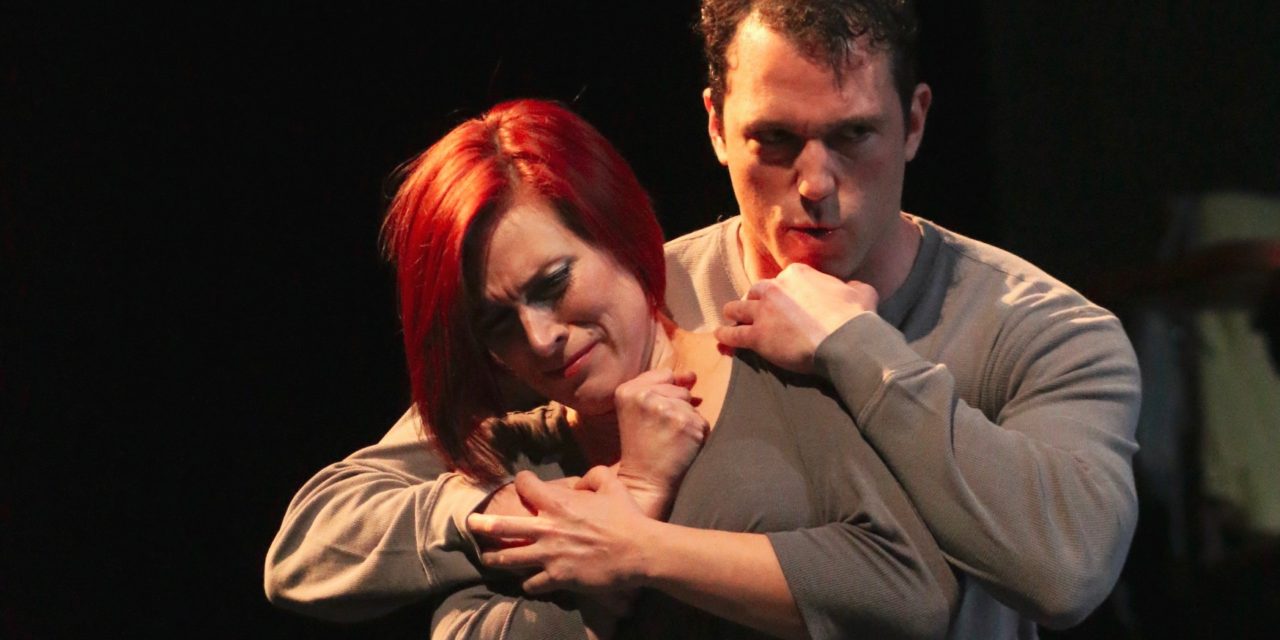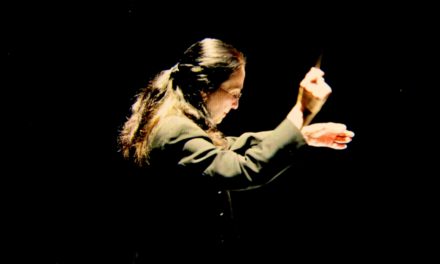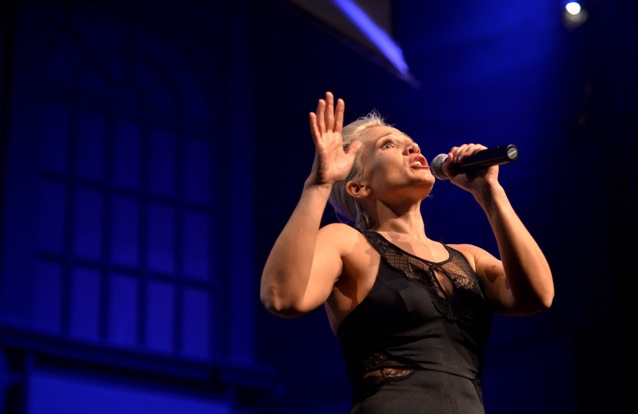(Above: Hannah Penn and Robert Wesley Mason portray Hannah After and Hannah Before in Eugene Opera’s production of As One; photo by Kelli Matthews)
By Randi Bjornstad
As operas go, the plot of As One is far from what people usually expect, but artistic director and maestro Andrew Bisantz is every bit as enthusiastic about this Eugene Opera offering as he would be about any of the many time-honored titles — classics such as La Traviata, The Marriage of Figaro, or La Bohème — that he has shepherded to the stage.
Rather than the misunderstandings, feuds, and mistaken identities that pepper the plots in the traditional operatic scene, As One deals with some of the same issues, but on an even more personal, introspective, and emotionally overwhelming level.
As One is the story of a transgender woman coming to grips with the fact that her original maleness is not the gender she is meant to be. It follows her agonies and ecstasies as she seeks the peace of finding — and accepting — her real self in a society that too often is not just unwelcoming, but openly hostile.
“Opera can serve a great function of starting conversations about difficult issues, and this is one of them,” Bisantz said. “In As One, we are not trying to make it everyone’s ‘trans’ story — this is one person’s story, Hannah’s story. But there is a lot in the narrative that is common to many people’s experience, so it can be broadening to people as a whole.”
The key to the portrayal is the relationship of the two singers, referred to as Hannah Before and Hannah After. Before is the purview of baritone Robert Wesley “Wes” Mason. Mezzo-soprano Hannah Penn is After.
“It was important to find singers who had some similarity to each other, so the audience could relate to them as really being the same person,” Bisantz said.
In the same way, it was important in the movie Moonlight — the 2017 winner of the Best Picture Oscar — to find three actors who shared some physical link to play the character of Chiron, as he grew from childhood through adolescence to young adulthood, he said.
“In the case of Moonlight, the actors all have similar eyes that helped audience link them together,” Bisantz said. “In our As One, Hannah and Wes have some similarity in their profiles, and they also share a similarity in intensity. We also looked for small things, such as expressions or physical movements, that can help build their identity as really being the same person.”
Besides that, the two singers simply have wonderful voices and stage presence, he said.
Penn has sung on the Eugene Opera stage several times, including in Die Fledermaus, Dialogue of the Carmelites, and as Jo in Little Women, “and she is just a wonderful, wonderful singer,” Bisantz said. “Her voice is so impactful — it makes for a very skilled performance. She’s so good, she makes it look easy.”
For his part, Mason “is sort of the male version” of Penn, Bisantz said. “His original training before opera was in musical theater, so he has very nuanced acting skills. He can inhabit a role in a wonderful way that is very impressive — I have been wanting to find him something to do in Eugene, so I’m glad this became possible.”
Both Penn and Mason have sung these roles before, “and they are very adept at portraying this incredibly complicated music,” Bisantz said.
As One is the creation of much-acclaimed composer 62-year-old Laura Kaminsky, whose many works span the pantheon of styles, from solo piano to chamber to string quartet as well as opera. Mark Campbell and Kimberly Reed created the libretto. The opera had its world premiere at the Brooklyn Academy of Music in September 2014.
Kaminsky’s exploration of transgender discovery and identity is just one example of the way opera has endured and transformed in the modern era, Bisantz said.
“I haven’t talked to Laura about her choice in writing As One, but certainly the atmosphere of ‘new opera’ is to embrace almost every topic imaginable,” he said.
Eugene Opera has not shied away from tackling unusual and difficult works in the past, such as Nixon in China, Dead Man Walking, and chamber operas such as The Turn of the Screw.
As One also is a chamber opera — meaning that it is performed in the more intimate space of the Soreng Theater in the Hult Center of the Performing Arts, with minimal staging, costuming, and accompaniment. The performers include two singers and a string quartet, augmented by a film backdrop created by Kimberly Reed.
“The film is really cool,” Bisantz enthused. “It’s actually more expressive of setting the scene than a regular set would be. Kimberly (Reed) has created a mood and atmosphere as well as a literal interpretation of the story. The way she evokes Hannah’s mind and memory is one of the dominant experiences of this show.”
“I think the whole thing is really impressive.”
As One
When: 7:30 p.m. on Friday, May 17; and 2:30 p.m. on Sunday, May 19
Where: Soreng Theater, Hult Center for the Performing Arts, One Eugene Center (Seventh and Willamette streets in downtown Eugene)
Tickets: $34-54 ($15 for youths high school and younger), available at the Hult Center box office, 541-682-5000, or online at hultcenter.org (additional handling fee for online orders)
Free Special Event: Panel discussion on Transgender Representation in Media & Art at 7 p.m. on Thursday, May 16, in the Browsing Room of the Knight Library at the University of Oregon, near East 15th Avenue and Kincaid Street. Panelists include As One creators Laura Kaminsky, Mark Campbell, and Kimberly Reed plus UO student Lily Bonasera and Eugene Opera stage director Keturah Stickann, moderated by Bethany Grace Howe and including excerpts sung from the opera by performers Hannah Penn and Robert Wesley Mason.












